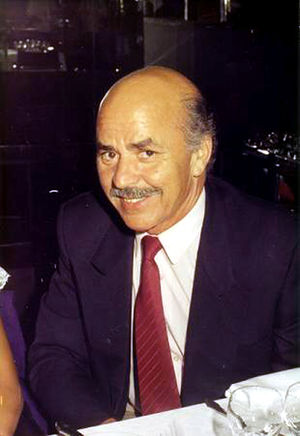Main Page
From Circopedia
|
In The Spotlight
ALI HASSANI
For some thirty years, Ali Hassani (1927-2010) ran the world's most famous troupe of Moroccan tumblers—and one of the best indeed in the entertainment business—before becoming a circus owner and producer in his adopted England. Yet, this highly respected artist and impresario came to the circus quite by accident, and in very unusual circumstances.
Ali Hassani was born Ali Houssain in a village on the outskirts of Marrakech, in Morocco, on March 7, 1927. Morocco has an age-long tradition of itinerant troupes of acrobats specializing in tumbling and building human pyramids, which for centuries have traveled from market places to village squares. They have been part of the circus practically since its inception, and can still be seen today in the ring, performing their traditional acrobatic skills in a style of presentation that has remained by and large unchanged.
Ali belonged to a poor family of thirteen children, and he and his siblings were often left to their own devices to scrap some food or make a few dirhams in the streets of Marrakech. One day, as he was watching a group of tumblers on Djama Al Ifna, a square in Marrakech, Ali, who was seven at the time, was abducted by the acrobats, who saw him as an ideal "top mounterIn an acrobatic or balancing act, the performer who holds the top position (on a human column, for instance)."—the light acrobat who stood at the top of their human pyramids.
It must be stressed, though, that Ali was not an unwilling participant; according to his daughter Zayna, "He used to run and watch as a child and the tumblers said 'do you want to do this?' and he was quite cheeky apparently and said 'yes' and they actually took him away with them." Nonetheless, his life changed forever, and he was never to see his parents or siblings again, in spite of his attempts at tracking them years later when he returned to Morocco.
The tumbling troupe, with young Ali in tow, found engagements in neighboring Spain, where they remained through the Spanish Civil War (1936-1939) and WWII, since Spain was neutral in the conflict. As an apprentice to the troupe, Ali was not paid: he was just given food and shelter, and the bare necessities of life. Yet, he enjoyed his new life and over the years, he became an excellent tumbler, eventually moving from a light top-mounter to a sturdy bottom man as he grew up.... (more...)
New Essays and Biographies
- Alessandro Guerra, Equestrian, Circus Director
- Jimmy Scott, Clown
- Alexis Gruss, Jr., Equestrian, Circus Owner
- Alona Zhuravel, Hand-Balancer
- George Carl, Clown
New Videos
- Gemini Twins, aerial poleA Hanging pole (similar to a Chinese pole), used as an aerial apparatus. (2023)
- TV Tribute to Alexis Gruss, Equestrian (2024)
- Milena & Christopher, Trapeze Act (2023)
- Khorlan, Aerial Sword Balancing (2020)
- Murillo & Ulysses, Hand-to-Hand Balancing (1989)
New Oral Histories
- For A Moment You Fly, The First Season of The Big Apple Circus (1977)
- Vladimir Durov Documentary on Russian Television (c.2000)
- Dolly Jacobs Interview at The Ringling (2018)
- Pinito del Oro's Interview on Spanish Television (1970)
- Gia Eradze's Interview on SSU TV (2015)
Circopedia Books
- Philip Astley & The Horsemen who invented the Circus, by Dominique Jando (2018)
A Message from the Founder
CIRCOPEDIA is a constantly evolving and expanding archive of the international circus. New videos, biographies, essays, and documents are added to the site on a weekly—and sometimes daily—basis. Keep visiting us: even if today you don't find what you're looking for, it may well be here tomorrow! And if you are a serious circus scholar and spot a factual or historical inaccuracy, do not hesitate to contact us: we will definitely consider your remarks and suggestions.
- Dominique Jando
- Founder and Curator
